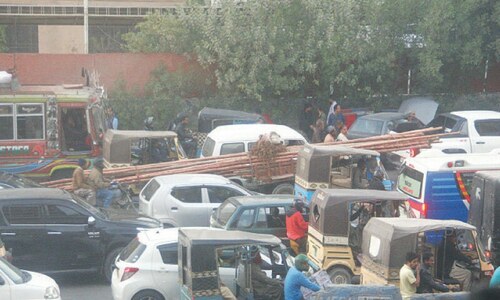KARACHI: Renowned journalist and human rights activist I.A. Rehman said on Friday that the situation for Pakistani media was much worse compared to what it was during the days of military dictatorships.
“Today, there is no space for journalists,” he said while speaking at the launch of Prof Dr Tauseef Ahmed Khan’s book Pakistan mein sahafat ki mutabadil tareekh here at the Karachi Press Club.
Presiding over the event, Mr Rehman first went down memory lane to narrate a few stories that indicated the substantive difference between journalism practised in those days and now. One of his stories dated back to 1970 when journalists went on a strike. The authorities got in touch with members of the media wondering why they were still on strike when their demands had been accepted. To which they replied that the demands were accepted for journalists but they also wanted their non-journalist co-workers to be facilitated. The strike proved to be a successful one.
Dr Tauseef Ahmed Khan’s book on history of Pakistani journalism launched
He said during the Ayub regime, the media couldn’t write on two to three subjects but was free to write about the rest. Even in Gen Zia’s tenure, when 19 newspapers were shut down and journalists were sent to jail, the situation was not as bad as it was these days, he added.
Referring to a comment made by an earlier speaker and connecting society’s role in the overall scenario, he argued how could one expect the different media unions to come together in an environment where people did not protest against the hike in electricity bills. However, it’s the media’s duty to tell the people what would happen if they don’t come out [to protest].
Commenting on the book, he lauded the author’s effort but mentioned the omission of newspapers such as The Frontier Post.
Earlier, Senator Hasil Bizenjo, acknowledging the worth of the book, said that it would familiarise the younger generation with the history of journalism in Pakistan.
He called it the history of resistance because the book contained information on newspapers and journals that were banned for promoting progressive thoughts — the resistance was shouldered by the likes of Faiz Ahmed Faiz, Nisar Osmani and Minhaj Barna.
Senator Bizenjo pointed out that nowadays the number of [news] TV channels had increased, as had the number of journalists, but no one was talking about the issues faced by the marginalised segment of society. Also, there was a time when two narratives [one put forward by the state and the other presented by the people who resisted] could be put together. Now that’s not the case: the room for the second narrative has lessened. He insisted that the journalists of today should resist like their predecessors.
Academic Dr Syed Jaffar Ahmed said that the book highlighted the history of the newspapers and magazines that espoused progressive ideas. It sheds light on the difficult times that they had to go through. It doesn’t, though, mention some important ones such as The Frontier Post. But its contents have important pieces of information and make the reader learn about the internal difficulties that newspaper employees have to bear. The best thing about the book is that it has gleaned things from basic sources, he said.
Dr Ahmed also appreciated the interviews printed in the book saying that they bring to light some new angles on the subject. Giving the example of unfamiliarity of the younger generation with East Pakistan (now Bangladesh) he stressed the need for theorising history.
The author, Dr Tauseef Ahmed Khan, said that when he set out to publish the book the idea was to write the history of those newspapers and journals that faced difficulties at the hands of military governments. Incidentally, all such media organisations were those that were known for their progressive ideas.
The author’s wife, Farzana, lent a lighter touch to the programme by speaking about how Dr Ahmed is like at home, and how he was deeply interested in the world of news and news dissemination from a very young age.
Sohail Sangi, Mazhar Arif, Mehnaz Rehman, Mazhar Abbas and Dr Riaz Sheikh also spoke.
Published in Dawn, October 5th, 2019
















































Dear visitor, the comments section is undergoing an overhaul and will return soon.